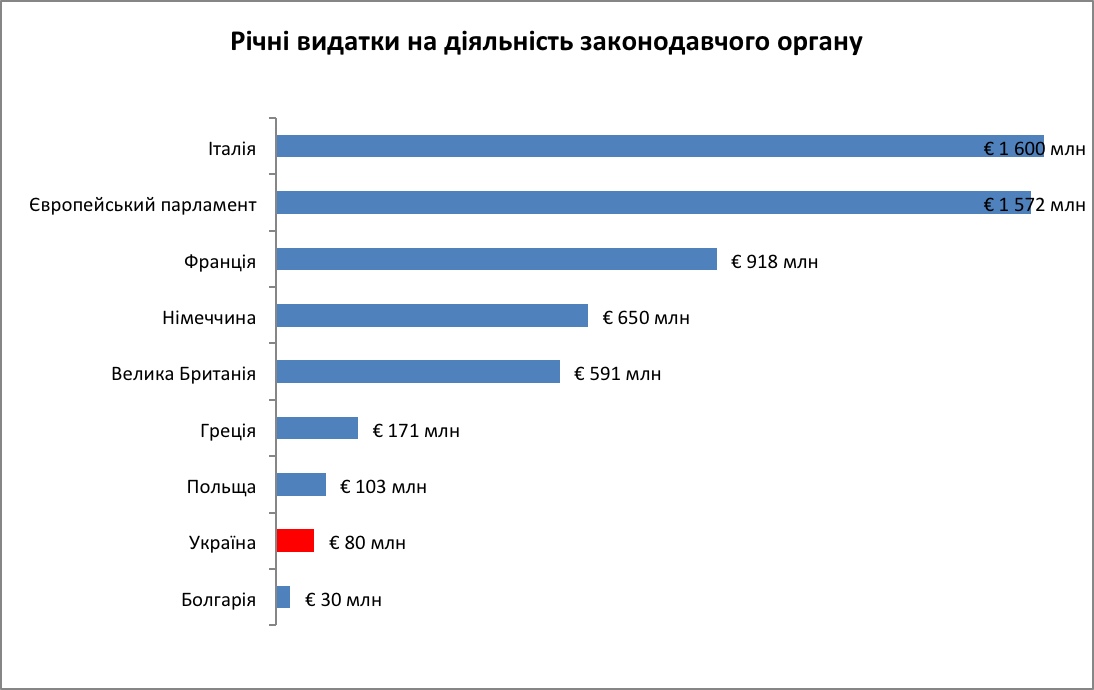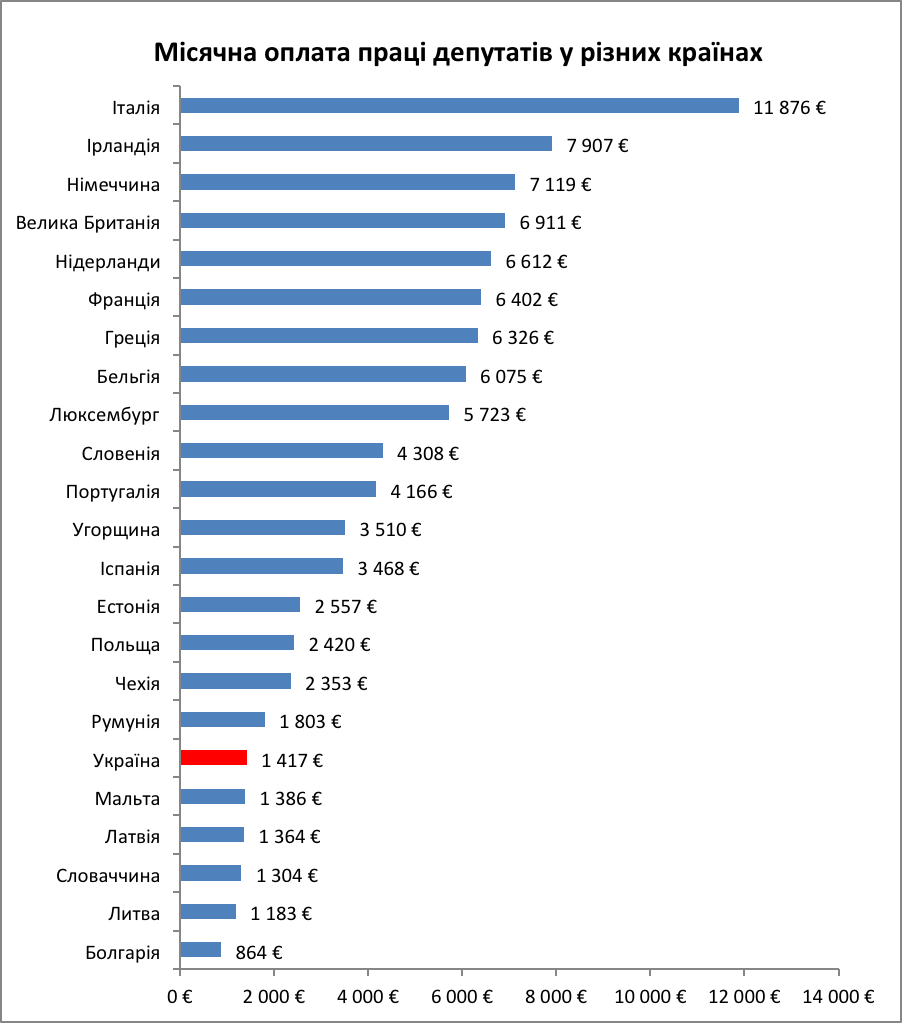On March 11, 2013, the Report on the budget of the Apparatus of the Verkhovna Rada of Ukraine was published on the official website of the VRU. According to the document, parliamentary expenses for the previous year have reached 822 million UAH. Is it much? It depends how to measure.
From the perspective of an average person, who lives in a world of banknotes with one zero or two, the number 821,957,300.00 UAH is astonishing and considered to be an unbelievable waste. From the perspective of the State Budget, yearly expenses of Ukrainian parliament constitute 0.2% of the total budget expenses in 2012. The same correlation (expenses of the parliament to the total budget expenses) has economically strong Germany, as well as less prosperous Greece or Bulgaria.
However, if to compare budget expenses on the Verkhovna Rada to the parliaments of Belgium or France, the sum of almost 822 million UAH is, for example, twice less than the equal percentage of Greece (with its 300 MPs) in 2012 during the crisis.
While in the period before crisis (before the total economy regime) expenses of Greek parliament were three times greater than Ukrainian. Poland, which is the biggest EU country by the population (38 million) and the number of MPs (460 persons), spends four times larger sums on its Seim than Ukraine on its VR. It is worth emphasizing that parliamentary expenses in Ukraine and in EU countries are of almost the same structure.
Of course, there are countries in EU like Bulgaria, which expenses on parliaments are the smallest in Europe. Compared to Ukraine, the Bulgarian parliament spends three times less money – only 30 million euro per year. However, Bulgaria has six time smaller population (7,4 million) which is burdened with expenses on the legislative body which contains almost two times less MPs (240).

Therefore, a widely spread apprehension of expenses on the Verkhovna Rada of Ukraine as excessive is not quite realistic. Fortunately for taxpayers, Ukrainian parliament is not the most expensive in Europe.
Salaries of MPs - is another teasing and alarming issue in the context of parliamentary expenses. As is generally known (without analyzing facts), Ukrainian MPs receive huge salaries and unrestricted benefits, without overworking oneself. It's a pity to ascertain, but Ukrainian law-makers cannot beat any records in wage rates.
Ruthless, yet not always convenient, truth is that wages of MPs, their habitation, travels, leaves/treatment constitute not more than a third part of total expenses of the parliament. The rest is remuneration for assistants, compensation for representative functions (consideration of voters; needs in districts), and maintenance of the Apparatus of the Verkhovna Rada of Ukraine, informational, analytical and logistical support of the Parliament.
Properly speaking, MPs have salaries from 14 to 20 thousand UAH, in average 17 thousand UAH (€1415). Is it much? Compared to EU countries, such level is among the lowest. MPs of Malta (€1386) and Latvia (€1364) receive almost the same amount, and MPs in Slovakia (€1304) receive a little less. MPs in Bulgaria have the smallest salaries – 860 euro a month. At the same time, members of Italian parliament have the highest salaries in the EU – 11870 euro, what is 8 times more than in Ukraine.

However, it's not time to feel sorry for Ukrainian MPs, as long as numbers themselves are not enough to make conclusions. Let's pay attention to the well-being of average citizens in every particular country. Fifteen thousand euro salary means different to the citizens of Ukraine and Europeans. It is the very issue regarding salaries of MPs in Ukraine and abroad. Compared to salaries of European MPs, Ukrainian deputies receive average sums. However, these sums are excessively huge when compared to the minimal subsistence in our country.
MPs of Ukraine receive salaries which are 13 times bigger than minimal salary of an average Ukrainian. Such gap is one of the biggest in Europe. The situation in Romania is similar, and in Hungary (salaries of MPs are 15 times bigger than minimal) as well as Italy (17 times bigger), it is even worse. A surprising social fairness can be witnessed in Malta, where MPs receive only 2 times bigger salaries than minimal, and in Luxembourg (3 times bigger salaries). At the same time, MPs in European countries receive 7 times bigger salaries than minimal.
Compared salaries do not include benefits and compensations, which are traditionally counted separately, and which are also bigger in Europe than in Ukraine.
What does it mean? Firstly, all these constant talks about reducing the size of parliamentary salaries and/or expenses of Parliament are populist. Secondly, the problem of Ukraine is not exceedingly high salaries of MPs, but chronically low salaries of average citizens. Moreover, there are no reasons to hope that minimal wages will rise after MPs' salaries are reduced. Besides that, the parliament (as well as MPs), won't have enough resources for efficient realization of its powers, i.e. it won't be independent. In such conditions, MPs will always need patrons and investors, and will have justified reasons for that. Thirdly, we forget that MPs are servants of the people because we pay them, not only because they were elected. During elections, we hire political managers which are supposed to fulfill their promises and represent our interests in the parliament, and which will receive a worthy salary and a possibility to be chosen on the following elections. This very reason gives us grounds to remand that MPs work efficiently and responsibly, and deserve their salaries and benefits.
Finally, some words about populism of MPs. I cannot stop wondering when MPs, so to say, are modestly talking about excessive salaries and benefits of MPs, and say that they are ready to refuse them, but still do not use cheap public transport and don't ride bicycles to work. PMs have to limit their expenses, not income, if they want to be closer to the people. An MP, whose official income is small, but expenses are high, cannot restore people's trust in parliament as a democratic institution by declaring readiness to refuse benefits and salary. It's only one part of the solution. The other part is that MPs should concentrate all their legislative efforts on ensuring the growth of minimum wages to the level of salaries of MPs, not vice versa.
See the video Is Ukrainian parliament costly?

